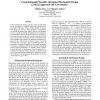241 search results - page 4 / 49 » Private Capacities in Mechanism Design |
SIGECOM
2008
ACM
13 years 7 months ago
2008
ACM
Often, we wish to design incentive-compatible algorithms for settings in which the players' private information is drawn from discrete domains (e.g., integer values). Our mai...
AAAI
2010
13 years 8 months ago
2010
In many multiagent settings, a decision must be made based on the preferences of multiple agents, and agents may lie about their preferences if this is to their benefit. In mechan...
ACMICEC
2003
ACM
14 years 18 days ago
2003
ACM
The aggregation of conflicting preferences is a central problem in multiagent systems. The key difficulty is that the agents may report their preferences insincerely. Mechanism ...
ACMICEC
2006
ACM
14 years 1 months ago
2006
ACM
This paper addresses a problem in supply chain management that how scarce resources can be efficiently allocated among competing interests. We present a formal model of allocation...
SOFSEM
2009
Springer
14 years 4 months ago
2009
Springer
Abstract. Computational mechanism design (CMD) seeks to understand how to design game forms that induce desirable outcomes in multiagent systems despite private information, self-i...



